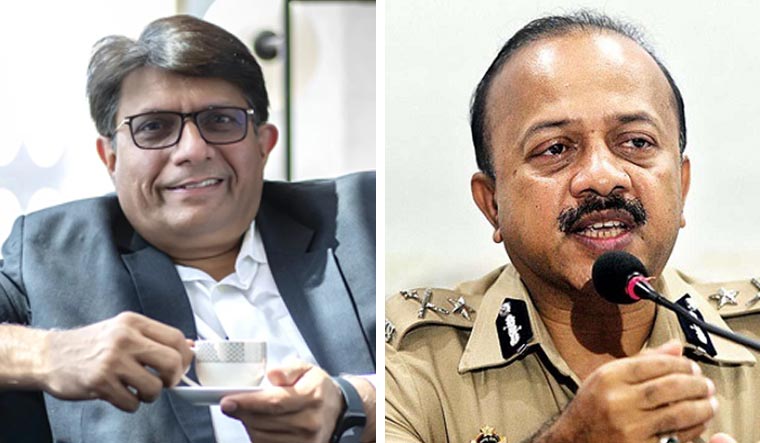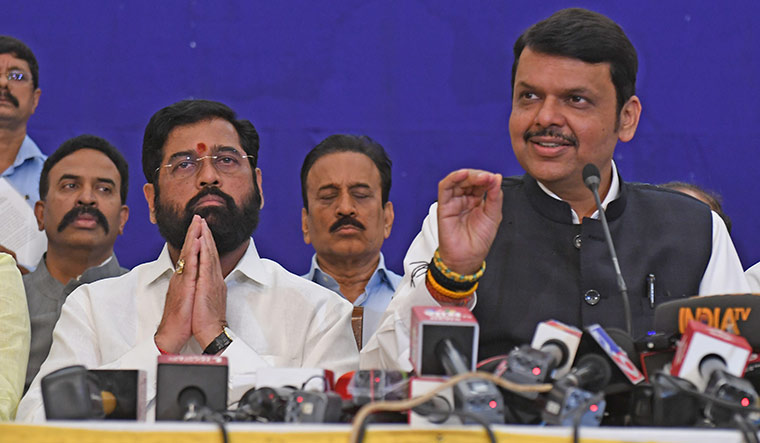THERE IS NEVER a quiet day in politics, especially so in a state such as Maharashtra. Two appointments made by the government have caused much heartburn in sociopolitical circles and the bureaucracy. The first was that of Ajay Ashar―by Chief Minister Eknath Shinde―as vice chairman of Maharashtra Institute for Transformation (MITRA), a planning body on the lines of NITI Aayog. And then, Deputy Chief Minister Devendra Fadnavis appointed senior police officer Deven Bharti as Mumbai’s special commissioner of police.
Though the government notification on Ashar’s appointment describes him as a social worker and infrastructure expert, he, essentially, is a builder from Thane―Shinde’s home turf. A close associate of Shinde, Ashar began as a small-time real estate player. His rise in business ran parallel to Shinde’s growth in state politics. The covert alliance between builders and politicians has been a mainstay of Maharashtra politics since the 1990s. And now, some politicians even flaunt their relations with big builders. For instance, Congress’s Vishwajeet Kadam is the son-in-law of Avinash Bhosale, a real estate and infrastructure baron from Pune. Though Shinde and Ashar do not share familial ties, their friendship is no secret.
Considering this background, how appropriate was it for Shinde to appoint Ashar as vice chairman of MITRA? This was one of several questions raised over Ashar’s appointment, apart from whether a builder could provide a grand vision for the state for the next 50 years and whether there would be any guarantee that his vision would not unduly promote the real estate lobby.
“Appointing a builder as vice chairman of MITRA, a body that the state government wants to raise to the level of NITI Aayog, is a classic case of intellectual bankruptcy,” said a Congress leader. “Clearly, the chief minister is favouring his friend. A body like MITRA should be headed by an eminent economist or a retired bureaucrat of the rank of chief secretary, who understands governance and policy-making.”
Sachin Sawant, general secretary of state Congress, said that during the Maha Vikas Aghadi’s (MVA) rule, there were allegations against some builders of earning huge profit as the government had reduced premiums on construction activity. “Then how ethical would it be to make one of them vice chairman of MITRA? A more important question is whether it makes any sense to hand over the state’s planning to a builder,” said Sawant.
 While Ajay Ashar (left) was appointed vice chairman of Maharashtra Institute for Transformation by Chief Minister Eknath Shinde, Deven Bharti (right) was made Mumbai’s special commissioner of police by Devendra Fadnavis.
While Ajay Ashar (left) was appointed vice chairman of Maharashtra Institute for Transformation by Chief Minister Eknath Shinde, Deven Bharti (right) was made Mumbai’s special commissioner of police by Devendra Fadnavis.
It is reliably learnt that even the BJP is not happy with Ashar’s appointment. Fadnavis wanted to discuss the appointment in the state cabinet meeting, but Shinde did not allow it, saying that as chief minister and chairman of MITRA he had the authority to choose his team.
“Ashar as MITRA vice chairman would be a big joke on the people of the state,” said a senior BJP legislator. “Apart from building fancy towers in Thane, what has been his contribution? Everyone knows that as a builder his main interest is essentially real estate development. That is why we wanted a scholarly person to be second vice chairman of MITRA, but Shinde did not allow that either. Instead, he made former MLA Rajesh Kshirsagar (leader from Kolhapur belonging to Shinde’s Shiv Sena faction) as second vice chairman of MITRA on the grounds that he was chairperson of the state planning board in the MVA regime.”
Meanwhile, Bharti’s appointment as special commissioner of police for Mumbai, too, has raised eyebrows. Greater Mumbai is divided into 12 police zones, each headed by a deputy commissioner of police. The deputy commissioners report to four additional commissioners, who head a region each. Above the additional commissioners are joint commissioners for crime, law and order and administration. And, heading this well-structured machinery is the commissioner of police. But now, a new post has been inserted, created on the lines of Delhi’s special commissioner of police.
The police fraternity is divided over the creation of the new post. While former Mumbai police commissioner Julio Ribeiro termed it an unwise move that would create friction between two topmost officers of Mumbai Police, former director general of police Praveen Dixit supported the move, saying crime investigation and law and order management in Mumbai were huge responsibilities that called for two commissioners.
According to a senior police officer, Bharti―a 1994-batch IPS officer known to be one of Fadnavis’s most trusted men in khaki―was transferred along with other IPS officers but without a posting. He was additional director general of police with the state security corporation, a sideline posting given by the MVA government. On transfer, he was not given a posting immediately but was kept waiting till the new post was created by the state home department, headed by Fadnavis. “The original idea was to remove the current police commissioner (Vivek Phansalkar), but he is close to Shinde,” said the senior police officer, requesting anonymity. “Also, making Bharti the commissioner would have meant sidelining many IPS officers senior to him and that would have caused a major unrest in the IPS lobby. Perhaps that is why a post of special commissioner was created for Bharti. With all joint commissioners reporting to Bharti, the commissioner effectively loses control over the police machinery despite being head of the organisation.”
A section of serving IPS officers sees the creation of the new post as a purely political move. Political bosses often tinker with the existing hierarchy to create posts for their trusted men. With Fadnavis not being chief minister in this term, he is going all out to make sure that he has a firm grip over the Mumbai Police.


